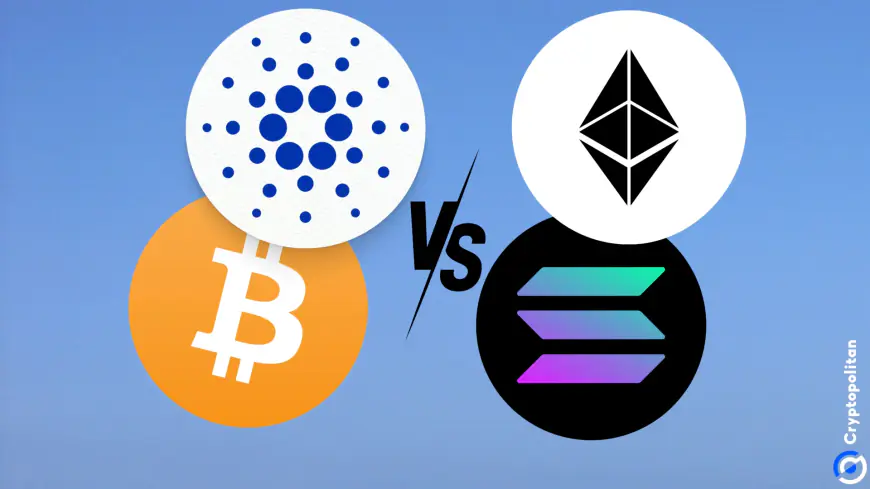Cardano founder Hoskinson sees DeFi on Bitcoin surpassing Ethereum and Solana
Cardano founder Charles Hoskinson believes the Bitcoin network could become home to the biggest decentralized finance (DeFi) ecosystem. In a post on X, Hoskinson said DeFi on Bitcoin could be bigger than Ethereum and Solana’s. The statement follows the integration of Cardano into the Bitcoin ecosystem through the BitcoinOS Grail Bridge. The founder earlier posted […]

Cardano founder Charles Hoskinson believes the Bitcoin network could become home to the biggest decentralized finance (DeFi) ecosystem. In a post on X, Hoskinson said DeFi on Bitcoin could be bigger than Ethereum and Solana’s.
The statement follows the integration of Cardano into the Bitcoin ecosystem through the BitcoinOS Grail Bridge. The founder earlier posted that Bitcoin and Cardano are coming together, noting that this was what he signed up for in 2010, as he believes decentralized currencies can change the world.
Hoskinson said:
“Bitcoin developers can develop Hybrid Cardano/Bitcoin applications in Aiken and pay their transaction fees in bitcoin. DeFi is coming to Bitcoin, and it will dwarf anything Solana and Ethereum have done.”
With this move, Hoskinson appears to have changed his perspective about Bitcoin now that the network is embracing innovation. A few months ago, he said that the crypto industry could survive without Bitcoin, but the flagship assets might not survive without the industry.
Cardano will bring DeFi to Bitcoin with Integration
At the center of Hoskison’s newfound passion for Bitcoin is Cardano’s collaboration with BitcoinOS, an infrastructure provider connecting smart contract platforms to the Bitcoin network. Through the collaboration, Cardano will leverage Grail Bridge, a zero-knowledge (zk) interoperability protocol that enables Bitcoin users to interact with other blockchain networks.
With this technology, Bitcoin transactions and assets will seamlessly integrate with Cardano, enabling Cardano builders to use Bitcoin security and liquidity. Cardano is the first Layer-1 network to integrate BitcoinOS, and Hoskinson believes this is a massive move. According to him, Bitcoin liquidity could finally flow out of its landlocked ecosystem, enabling BTC holders to get involved in the DeFi ecosystem.
He said:
“[BitcoinOS] is going to let Bitcoin flow into the crypto world, and they finally get to ditch their boring lives and enjoy DeFi, GameFi, and the magic of Smart Contracts.”
Meanwhile, BitcoinOS is not the first to try to bring DeFi to the Bitcoin ecosystem. With its massive liquidity due to BTC, the Bitcoin network has attracted many developers. This has led several developers to build interoperability layers connecting Bitcoin to other chains. Still, the network’s limited programmability has made it difficult to fully bring DeFi activity to Bitcoin compared to other networks such as Solana and Ethereum.
According to data from Defillama, the total value locked (TVL) for Bitcoin is $2.1 billion. This is relatively low compared to Ethereum, with $47 billion, and Solana, with $6.48 billion. However, efforts from developers such as BitcoinOS and networks like Cardano could soon change that. BitcoinOS is already courting Kraken Layer-2 network Ink also to integrate the technology.
Hoskinson to restart Bitcoin Educational Project
With Hoskinson now embracing Bitcoin, he has promised to relaunch his Bitcoin Education Project (BEP) by 2025 and offer a new course. Hosikson founded BEP in 2013 to reduce the barrier of entry for people into the Bitcoin ecosystem and secured partnerships with Bitcoin Magazine and Udemy.
The Cardano founder added that he would also arrange training sessions for Bitcoin developers on using Aiken to build hybrid Cardano/Bitcoin decentralized applications (dApps). Aiken is the programming language for smart contracts on Cardano, making it essential to develop apps compatible with Bitcoin and Cardano.
Interestingly, such dApps will charge their fees in BTC instead of Cardano ADA. This is possible through Babel fees, another feature enabling Cardano network participants to pay fees in cryptocurrencies other than the native asset. This is expected to benefit Cardano developers.
What's Your Reaction?









































































































